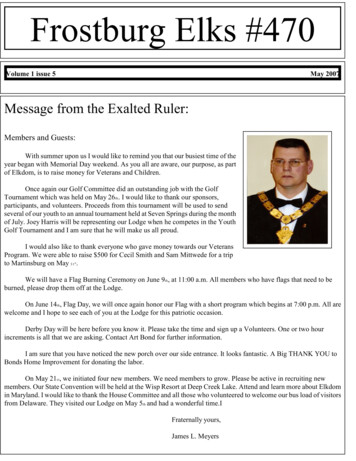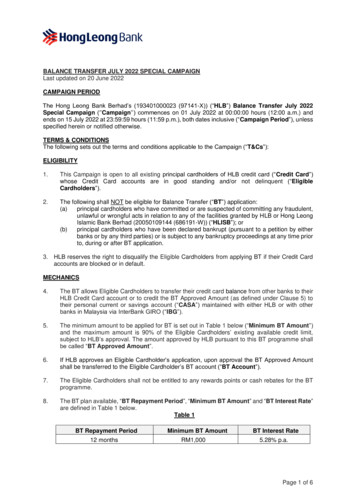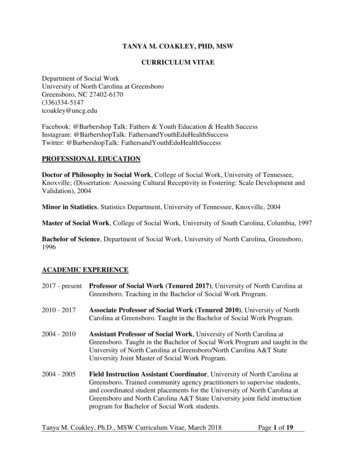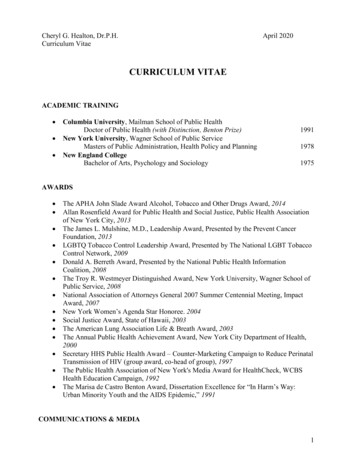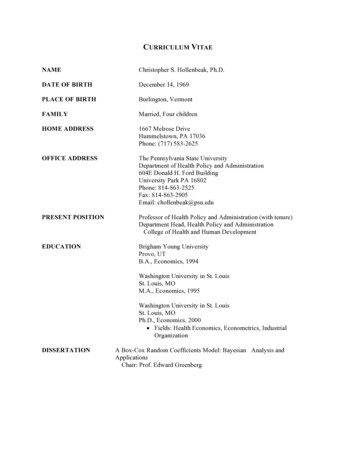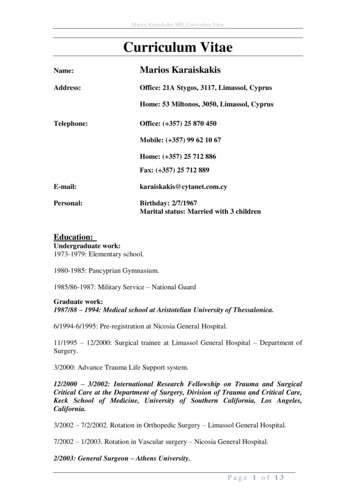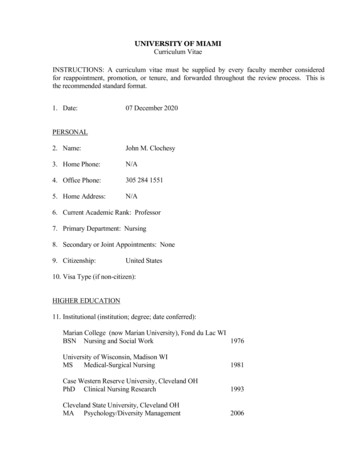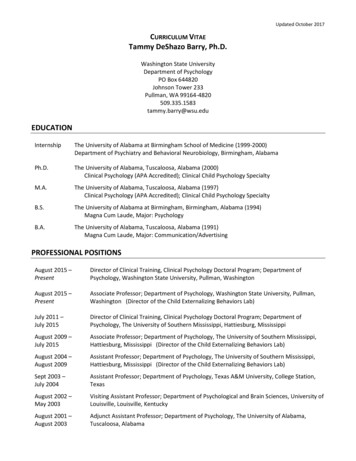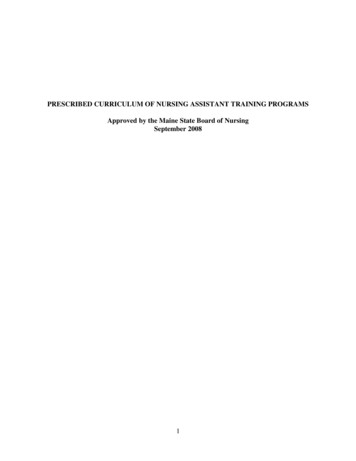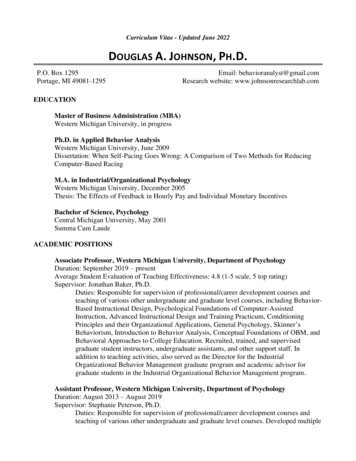
Transcription
Curriculum Vitae - Updated June 2022DOUGLAS A. JOHNSON, PH.D.P.O. Box 1295Portage, MI 49081-1295Email: behavioranalyst@gmail.comResearch website: www.johnsonresearchlab.comEDUCATIONMaster of Business Administration (MBA)Western Michigan University, in progressPh.D. in Applied Behavior AnalysisWestern Michigan University, June 2009Dissertation: When Self-Pacing Goes Wrong: A Comparison of Two Methods for ReducingComputer-Based RacingM.A. in Industrial/Organizational PsychologyWestern Michigan University, December 2005Thesis: The Effects of Feedback in Hourly Pay and Individual Monetary IncentivesBachelor of Science, PsychologyCentral Michigan University, May 2001Summa Cum LaudeACADEMIC POSITIONSAssociate Professor, Western Michigan University, Department of PsychologyDuration: September 2019 – presentAverage Student Evaluation of Teaching Effectiveness: 4.8 (1-5 scale, 5 top rating)Supervisor: Jonathan Baker, Ph.D.Duties: Responsible for supervision of professional/career development courses andteaching of various other undergraduate and graduate level courses, including BehaviorBased Instructional Design, Psychological Foundations of Computer-AssistedInstruction, Advanced Instructional Design and Training Practicum, ConditioningPrinciples and their Organizational Applications, General Psychology, Skinner’sBehaviorism, Introduction to Behavior Analysis, Conceptual Foundations of OBM, andBehavioral Approaches to College Education. Recruited, trained, and supervisedgraduate student instructors, undergraduate assistants, and other support staff. Inaddition to teaching activities, also served as the Director for the IndustrialOrganizational Behavior Management graduate program and academic advisor forgraduate students in the Industrial Organizational Behavior Management program.Assistant Professor, Western Michigan University, Department of PsychologyDuration: August 2013 – August 2019Supervisor: Stephanie Peterson, Ph.D.Duties: Responsible for supervision of professional/career development courses andteaching of various other undergraduate and graduate level courses. Developed multiple
D. A. Johnson 2courses to be offered for the first time through WMU's Department of Psychology,including Behavioral Training and Teaching Strategies, Professional and CareerDevelopment, Social Psychology, Behavior-Based Instructional Design, PsychologicalFoundations of Computer-Assisted Instruction, Advanced Instructional Design andTraining Practicum, and Conditioning Principles and their Organizational Applications.Taught multiple pre-existing courses, including General Psychology, Survey ofBehavior Analysis Research, Skinner’s Behaviorism, and Behavioral Approaches toCollege Education. Recruited, trained, and supervised graduate student instructors,undergraduate assistants, and other support staff. In addition to teaching activities, alsoserved as the Director of Undergraduate Training, Co-Director for the IndustrialOrganizational Behavior Management graduate program, and academic advisor forgraduate students in the Industrial Organizational Behavior Management program.Faculty Specialist, Western Michigan University, Department of PsychologyDuration: July 2009 – June 2013Supervisor: Wayne Fuqua, Ph.D.Duties: Responsible for supervision of all introductory psychology courses (yearlyenrollment of 1900 students) and management of the Psychology UndergraduateAdvising Office.Part-time Faculty, Western Michigan University, Department of Counseling Educationand Counseling PsychologyDuration: January 2013 – April 2013Supervisor: Patrick Munley, Ph.D.Duties: Responsible for teaching Social Psychology for doctoral students.Part-time Instructor, Kalamazoo Valley Community CollegeDuration: September 2010 – April 2012Supervisor: Nora Evers, Ph.D.Duties: Responsible for teaching psychology courses, including Introduction toPsychology and Educational Psychology.PEER-REVIEWED JOURNAL ARTICLES AND BOOK CHAPTERSJohnson, D. A., Johnson, C. M., & Dave, P. (in press). Performance feedback in organizations:Understanding the functions, forms, and important features. Journal of OrganizationalBehavior Management.Bucklin, B. R., Li, A., Rodriguez, M., Johnson, D. A., & Eagle, L. M. (in press). Pay-forperformance: Behavior-based recommendations from research and practice. Journal ofOrganizational Behavior 047868Johnson, D. A., & Johnson, C. M. (in press). Foundations and advances: Revisiting the pastand selecting for the future. Journal of Organizational Behavior 029797Choi, E., & Johnson, D. A. (2022). Common antecedent strategies within organizationalbehavior management: The use of goal setting, task clarification, and job aids. Journal
D. A. Johnson 3of Organizational Behavior Management, 42(1), 4Brethower, D. M., Dickinson, A. M., Johnson, D. A., & Johnson, C. M. (2022). A history oforganizational behavior management. Journal of Organizational BehaviorManagement, 42(1), 3-35. on, D. A. (2022). The foundations of behavior-based instructional design withinbusiness. In R. Houmanfar, M. Fryling, and M. Alavosius (Eds.), Applied BehaviorScience in Organizations: Consilience of Historical and Emerging Trends inOrganizational Behavior Management. (pp. 65-80). Taylor & Francis.Bradley, J. L., & Johnson, D. A. (2021). Creating creativity: A behavior analytic approach.The Psychological Record, 71(4), 553-565. dd, D., Johnson, D., & Johnson, K. (2021). Introduction to special issue: A creativecollaboration. The Psychological Record, 71(4), Akpapuna, M., Choi, E., Johnson, D. A., & Lopez, J. A. (2020). Encouraging multiculturalismand diversity within organizational behavior management. Journal of OrganizationalBehavior Management, 40(3-4), 014Warrilow, G. D., Johnson, D. A., & Eagle, L. M. (2020). The effects of feedback modality onperformance. Journal of Organizational Behavior Management, 40(3-4), 351Chae, S., Eagle, L. M., Johnson, D. A., Moon, K., Choi, E., & Oah, S. (2020). The impact ofauthority relations and feedback delivery method on performance. Journal ofOrganizational Behavior Management, 40(1-2), 476Park, J., Johnson, D. A., Moon, K., & Lee, J. (2019). The interaction effects of frequency andspecificity of feedback on work performance. Journal of Organizational BehaviorManagement, 39(3-4), 164-178. pin, A. L., Johnson, D. A., & Ferragut, T. N. (2018). Using feedback and postfeedbackdelays to improve performance with online lessons. The Psychological Record, 68(4),489-499. https://doi.org/10.1007/s40732-018-0295-yChoi, E., Johnson, D. A., Moon, K., & Oah, S. (2018). Effects of positive and negativefeedback sequence on work performance and emotional responses. Journal ofOrganizational Behavior Management, 38(2-3), 51Johnson, D. A., & Akpapuna, M. (2018). A pragmatic approach for building motivation topromote employee creativity and organizational innovation. In B. Wine & J. K.
D. A. Johnson 4Pritchard (Eds.), Essentials of Organizational Behavior Management. (pp. 242-273).Hedgehog Publishers.Longacre, T. M., Eagle, L. M., Johnson, D. A., & Palmer, M. G. (2018). Book review of “TheLiberated Workplace: Transitioning to Walden Three”. Journal of OrganizationalBehavior Management, 38(1), 90-95. , R., & Johnson, D. A. (2018). Coaching as a packaged intervention for telemarketingpersonnel. Journal of Organizational Behavior Management, 38(1), 1Conard, A. L., Johnson, D. A., Morrison, J. D., & Ditzian, K. (2016). Tactics to ensuredurability of behavior change following the removal of an intervention specialist: Areview of temporal generality within organizational behavior management. Journal ofOrganizational Behavior Management, 36(2-3), 036Lebbon, A., Lee, S. C., & Johnson, D. A. (2015). Feedback facilitates transfer of training withU. S. Hispanic workers in a healthcare laundry linen facility. Injury Prevention, 21(6),404-414. son, D. A., Rocheleau, J. M., & Tilka, R. E. (2015). Considerations in feedback delivery:The role of accuracy and type of evaluation. Journal of Organizational BehaviorManagement, 35(3-4), 240-258. r, M. G., Johnson, C. M., & Johnson, D. A. (2015). Objective performance feedback: Isnumerical accuracy necessary? Journal of Organizational Behavior Management, 35(34), 206-239. , H. M., & Johnson, D. A. (2015). Performance motivation as the behaviorist views it.Performance Improvement, 54(4), 15-21. https://doi.org/10.1002/pfi.21472Marroletti, K., & Johnson, D. A. (2014). Current best practices for creating effective andpalatable eLearning. Revista Mexicana de Análisis de la Conducta [Mexican Journal ofBehavior Analysis], 40, 73-84.Johnson, D. A. (2014). The need for an integration of technology, behavior-based instructionaldesign, and contingency management: An opportunity for behavior analysis. RevistaMexicana de Análisis de la Conducta [Mexican Journal of Behavior Analysis], 40, 5872.Johnson, D. A., Casella, S. E., McGee, H., & Lee, S. C. (2014). The use and validation of preintervention diagnostic tools in Organizational Behavior Management. Journal ofOrganizational Behavior Management, 34(2), 09Johnson, D. A. (2013). A component analysis of the impact of evaluative and objectivefeedback on performance. Journal of Organizational Behavior Management, 33(2), 89103. https://doi.org/10.1080/01608061.2013.785879
D. A. Johnson 5Johnson, D. A., Arnold, M. C., Ponick, E., & Schenk-Mathes, H. Y. (2013). Experimentalevidence regarding the use of public identification and incentives in an employee-ofthe-month program. OBM Network News, 27(3), 13-20.Johnson, D. A., & Dickinson, A. M. (2012). Using postfeedback delays to improve retention ofcomputer-based instruction. The Psychological Record, 62(3), 485-495.https://doi.org/10.1007/BF03395815Johnson, D. A., & Christensen, J. (2011). A comparison of simplified-visually rich andtraditional presentation styles. Teaching of Psychology, 38(4), hnson, D. A., & Rubin, S. (2011). Effectiveness of interactive computer-based instruction: Areview of studies published 1995-2007. Journal of Organizational BehaviorManagement, 31(1), 55-94. n, D. A., & Dickinson, A. M. (2010). Employee-of-the-month programs: Do they reallywork? Journal of Organizational Behavior Management, 30(4), 44Rubin, S., Spates, C. R., Johnson, D. A., & Jouppi, L. (2009). Dosed versus prolongedexposure in the treatment of fear: An experimental evaluation and review of behavioralmechanisms. Journal of Anxiety Disorders, 23(6), 005Johnson, D. A., Dickinson, A. M., & Huitema, B. E. (2008). The effects of objective feedbackon performance when individuals receive fixed and individual incentive pay.Performance Improvement Quarterly, 20(3/4), 53-74. https://doi.org/10.1002/piq.20003PUBLISHED BOOKSMiller, N. P., & Johnson, D. A. (2015). Preparing for the bar exam: A comprehensive guide toplans, programs, content, conditions, and skills. Crown Management.Johnson, D. A. (2011). Study Guide for Invitation to Psychology (5th ed.). Pearson Education,Inc.Johnson, D. A. (2010). Study Guide for Psychology (10th ed.). Pearson Education, Inc.PROFESSIONAL PRESENTATIONS AND WORKSHOPSJohnson, D. A. (2022, May). Using an organizational behavior management framework tobetter understand promotion and compensation practices as part of a strategy toaddress equity concerns. Presentation at the annual conference of the Association forBehavior Analysis International, Boston, MA.
D. A. Johnson 6Johnson, D. A. (2021, November). What differentiates organizational behavior managementfrom other business solutions? Why you might not need to care but probably stillshould. Invited presentation at the National Autonomous University of Mexico.Yeboah, M., & Johnson, D. A. (2021, June). How to go beyond vision and to build leadershipout of behavior. Presentation at the Black Applied Behavior Analysts InauguralConference.Johnson, D. A., Choi, E., Lopez, J. A., & Yeboah, M. (2021, June). Tools and guidance thatOBM can provide in the service of diversity, equity, and inclusion. Presentation at theBlack Applied Behavior Analysts Inaugural Conference.Johnson, D. A. (2019, October). Establishing educational repertoires under the guidance ofbehavior-based instructional design. Invited presentation at the Michigan AutismConference, Kalamazoo, MI.Johnson, D. A. (2019, September). Why work is bad and how we can do better. Invitedpresentation at Stand Up Science, Kalamazoo, MI.Gravina, N., Houmanfar, R., & Johnson, D. A. (2019, May). Organizational BehaviorManagement: The present and future of the field. Invited panel discussion at the annualconference of the Association for Behavior Analysis International, Chicago, IL.Crone-Todd, D. E., Johnson, K., Johnson, D. A., Killeen, P. R., Marr, M. J., & Rosales-Ruiz,J. (2019, May). Creativity panel. Invited panel discussion at the annual conference ofthe Association for Behavior Analysis International, Chicago, IL.Johnson, D. A. (2019, May). Using the science of behavior to engineer creativity andinnovation in the workplace. Invited presentation at the annual conference of theAssociation for Behavior Analysis International, Chicago, IL.Johnson, D. A. (2019, March). Using behavior-based instructional design to discover the bestin your employees. Invited presentation at the Florida Tech Behavior AnalysisConference, Melbourne, FL.Johnson, D. A. (2018, August). Concept analysis in the instructional design process. Invitedpresentation at the Swedish Association for Behavior Analysis Applied OBMConference, Stockholm, Sweden.Johnson, D. A. (2017, July). The robots are coming! An analysis of creativity in the workplace.Invited presentation at the Organizational Behavior Management: Origins, Applications,and Advantages Conference, Kinneret Academic College, Israel.Ireland, M., Akpapuna, M., Johnson, D. A. (2017, July). Coaching the leaders of tomorrow.Invited presentation at the Organizational Behavior Management: Origins, Applications,and Advantages Conference, Kinneret Academic College, Israel.
D. A. Johnson 7Akpapuna, M., & Johnson, D. A. (2017, July). Of carrots and sticks: A behavioral approach tomotivation. Invited presentation at the Organizational Behavior Management: Origins,Applications, and Advantages Conference, Kinneret Academic College, Israel.Johnson, D. A. (July, 2017). Organizational Behavior Management: An introduction to thescience of behavior in the workplace. Invited presentation at the OrganizationalBehavior Management: Origins, Applications, and Advantages Conference, KinneretAcademic College, Israel.Akpapuna, M., & Johnson, D. A. (2016, May). It all started with monkeys and raisins: Thehistory of the intrinsic/extrinsic motivation debates. Presentation at the annualconference of the Association for Behavior Analysis International, Chicago, IL.Warrilow, G., & Johnson, D. A. (2016, May). Effects of feedback modality on performance.Presentation at the annual conference of the Association for Behavior AnalysisInternational, Chicago, IL.Morrison, J., Conard, A., & Johnson, D. A. (2016, May). The durability of behavior change:Temporal generality in Organizational Behavior Management. Presentation at theannual conference of the Association for Behavior Analysis International, Chicago, IL.Tilka, R., Rocheleau, J., & Johnson, D. A. (2015, May). The role of accuracy and type ofevaluation in feedback delivery. Presentation at the annual conference of theAssociation for Behavior Analysis International, San Antonio, TX.Johnson, K., Spence, I., Johnson, D., & Evans, A. (2014, December). What is a curriculum?Invited panel discussion at the annual international Precision Teaching Conference,Chicago, IL.Johnson, D. A. (2014, October). Motivation and feedback: Teasing apart some of the mostimportant variables in Organizational Behavior Management. Invited presentation atthe Mid-American Association for Behavior Analysis Conference, St. Louis, MO.Johnson, D. A. (2014, June). The application of Organizational Behavior Management andbehavior-based instructional design to the workplace and educational settings.Presentation at the Israeli Association for Behavior Analysis Conference, Tel Aviv,Israel. First OBM presentation in Israel.Johnson, D. A. (2013, November). The need for instructional design with educationalinnovations. Ignite-style presentation at the ABAI Education Conference, Chicago, IL.Lee, S. C., Johnson, D. A., & Lebbon, A. R. (2013, October). Reducing nonfatal occupationalinjuries among Hispanic workers with the implementation of behavior-based safetytraining in Spanish. Poster at the annual international conference of the Association forBehavior Analysis International, Mérida, Mexico.Johnson, D. A. (2013, May). Evidence-based strategies to improve time management and selfdirected learning in higher education. Invited workshop at the Office of FacultyDevelopment, Western Michigan University, Kalamazoo, MI.
D. A. Johnson 8Johnson, D.A., & Lebbon, A. R. (2013, March). Critical feedback elements every managershould know for enhancing workplace communication. Presentation at the Academicand Business Research Institute International Conference, New Orleans, LA.Johnson, D.A., & McGee, H. M. (2013, February). The use and validation of pre-interventiondiagnostic tools in OBM. Presentation at the California Association for BehaviorAnalysis, Garden Grove, CA.Johnson, D. A. (2012, May). How to use behavioral science to drive employee performancerather than drive the employees away. Presentation at the Global Conference onBusiness and Finance, San José, Costa Rica. Winner of Best in Session Award. FirstOBM presentation in Costa Rica.Johnson, D. A. (2012, February). Incorporating instructional design into teaching andtraining. Invited presentation at the Texas Association for Behavior Analysisconference, Austin, TX.Johnson, D. A. (2012, February). A holistic organizational approach to driving the bestperformance in employees. Invited workshop at the Texas Association for BehaviorAnalysis conference, Austin, TX.Johnson, D. A., & Slowiak, J. M. (2011, September). Out of the lab and into employeetraining: The application of instructional lessons to the training process. Invitedpresentation at the Minnesota Northland Association for Behavior Analysis conference,St. Cloud, MN.Slowiak, J. M., & Johnson, D. A. (2011, September). Out of employee training and into thedaily grind: The application of OBM to supporting everyday workplace behavior.Invited presentation at the Minnesota Northland Association for Behavior Analysisconference, St. Cloud, MN.Johnson, D. A., Casella, S. E., & Lee, S. C. (2011, May). The science behind behavioralsystems analysis: A review of the Journal of Organizational Behavior Management.Presentation at the annual conference of the Association for Behavior AnalysisInternational, Denver, CO.Johnson, D. A. (2010, May). Isolating the critical components of effective feedback on a dataentry task. Presentation at the annual conference of the Association for BehaviorAnalysis International, San Antonio, TX.Johnson, D. A., Arnold, M., Ponick, E., & Schenk-Mathes, H. (2010, May). Three empiricalexaminations of employee of the month. Presentation at the annual conference of theAssociation for Behavior Analysis International, San Antonio, TX.Christensen, J., & Johnson, D. A. (2010, February). A comparison of simplified-visual andtraditional presentation styles. Poster at the annual conference of the Behavior AnalysisAssociation of Michigan, Ypsilanti, MI.
D. A. Johnson 9Johnson, D. A. (2009, May). Employee-of-the-month programs: Do they really work?Presentation at the annual conference of the Association for Behavior AnalysisInternational, Phoenix, AZ.Johnson, D. A., & Dickinson, A. M. (2009, May). When self-pacing goes wrong: Acomparison of two methods for reducing computer-based racing. Presentation at theannual conference of the Association for Behavior Analysis International, Phoenix, AZ.Johnson, D. A. (2009, March). Improving self-pacing in computer-based instruction.Presentation at the annual conference of the Behavior Analysis Program ResearchConference, Kalamazoo, MI.Johnson, D. A., & Munson, K. (2008, August). Creating excellent learning experiences.Invited group discussion at the Reaching Results Conference, Kalamazoo, MI.Johnson, D. A., & Rubin, S. (2007, May). Learning with computer-based instruction: A reviewof best practices. Presentation at the annual conference of the Association for BehaviorAnalysis International, San Diego, CA.Johnson, D. A. (2007, May). Going beyond simple interactions: How to get the most out ofyour computer-based instruction. Invited presentation at the annual BehaviouralManagement Techniques Leadership Conference, Warrington, Cheshire, UK.Fuqua, R. W., Johnson, D. A., & Rubin, S. (2007, March). When successful programs areimperiled: Lessons learned from saving Western Michigan University's graduatepsychology programs. Invited presentation at the annual conference of the BehaviorAnalysis Association of Michigan, Ypsilanti, MI.Johnson, D. A. (2007, January). OBM & CBI: Integrating computer training into theworkplace. Invited presentation at the bi-annual conference of the Florida Associationfor Behavior Analysis and the Organizational Behavior Management Network,Sarasota, FL.Johnson, D. A., Culig, K. M., & Dickinson, A. M. (2005, May). The effects of feedback onindividual monetary incentives. Presentation at the annual conference of the Associationfor Behavior Analysis International, Chicago, IL.Culig, K. M., Johnson, D. A., & Dickinson, A. M. (2005, May). The effects of individualmonetary incentive with individual feedback and group monetary incentives with groupfeedback on high performance. Presentation at the annual conference of the Associationfor Behavior Analysis International, Chicago, IL.Johnson, D. A. (2005, April). The effects of feedback on hourly pay and individual monetaryincentives. Paper presented at the annual conference of the Behavior Analysis ProgramResearch Conference, Kalamazoo, MI.Johnson, D. A. (2001, March). Music concept learning in rats. Poster at the annual conferenceof the Behavior Analysis Association of Michigan, Ypsilanti, MI.
D. A. Johnson 10TEACHING EXPERIENCEInstructor of Record: General Psychology (PSY 1000)Duration: September 2008-present, Western Michigan UniversityAverage Enrollment: 20-230 studentsCourse covered topics such as psychology as a natural science, learning strategies &study techniques, research methods, biology & behavior, consciousness, development,learning, language, memory, intelligence, personality, social psychology, perception,motivation, emotion, stress & health, industrial/organizational psychology,psychological disorders, and therapies.Instructor of Record: Behavior-Based Instructional Design (PSY 6549)Duration: September 2010-present, Western Michigan UniversityAverage Enrollment: 20 studentsGraduate level practicum course that covered topics such as different types of learning,conceptual stimulus control training, contingency adduction, principle applying,selection of instructional examples and non-examples, meaningful active responding,and fluency development.Instructor of Record: Behavioral Approaches to College Education (PSY 6900)Duration: January 2012-present, Western Michigan UniversityAverage Enrollment: 15 studentsGraduate level course that covered topics such as university/college classifications,grading practices, development of instructional material, Personalized System ofInstruction, Direct Instruction, Precision Teaching, Generative Instruction, at-homestudy behaviors of students, presentation technology, promoting group activities, courseevaluations, online and hybrid classrooms, discovery learning, constructivism, learningstyles, diversity education, considerations with textual material, academic dishonesty,testing and examinations, classroom demonstrations, critical and scientific thinking, andassessment of course outcomes. The relation of these topics to higher education wasemphasized.Co-Instructor of Record: Professional and Career Development (PSY 3844)Duration: September 2012-present, Western Michigan UniversityAverage Enrollment: 40 studentsCourse covered topics such as career specializations in psychology, active explorationof career and educational options, professional resume and portfolio creation, steps forconnecting with employers and other professionals, proper interviewing etiquette, thedevelopment of self-regulatory skills, successful goal setting, comprehensive strategiesfor self-change, and problem-solving obstacles.Instructor of Record: Skinner’s Behaviorism (PSY 6760)Duration: January 2014-present, Western Michigan UniversityAverage Enrollment: 15 studentsGraduate level course that covered the historical background, scientific and socialsignificance, philosophy, and methodology of behaviorism as conceptualized by B. F.Skinner.
D. A. Johnson 11Instructor of Record: Psychological Foundations of Computer-Assisted Instruction (PSY6484)Duration: January 2016-present, Western Michigan UniversityAverage Enrollment: 15 studentsGraduate level course that covered the application of instructional design principles tocomputer-assisted instruction. Course considered both behavioral and cognitivetheoretical foundations of computer-assisted instruction, basic and advanced principlesinvolved in computer-assisted instruction, and the use of computer-assisted instructionin various content areas.Instructor of Record: Introduction to Behavior Analysis (PSY 1400)Duration: May 2022-present, Western Michigan UniversityAverage Enrollment: 40 studentsCourse covered topics such as respondent and operant conditioning, reinforcement,punishment, extinction, shaping, schedules of reinforcement, discriminative stimuli,motivating operations, fading, chaining, generalization, maintenance, and verbalbehavior.Instructor of Record: Conceptual Foundations of OBM (PSY 5970)Duration: July 2022-present, Western Michigan UniversityAverage Enrollment: 15 studentsCourse covered topics such as empiricism, molar/molecular distinctions, pinpointedbehavior, functional approaches to semantics, explanatory fictions, determinism, logicalpositivism, operationism, essentialism, selectionism, methodological behaviorism, andradical behaviorism.Instructor of Record: Advanced Instructional Design and Training Practicum (PSY 6494)Duration: September 2015-April 2020, Western Michigan UniversityAverage Enrollment: 5 studentsGraduate level course that covered best practices of instructional design and trainingassessment to improve training outcomes for organizational clients. Student workedwith organizational team members to conduct training needs analyses and developinstructional solutions.Instructor of Record: Conditioning Principles and their Organizational Applications(PSY 6166)Duration: September 2016-December 2019, Western Michigan UniversityAverage Enrollment: 10 studentsGraduate level course that served as a scholarly introduction to basic and advancedprinciples of behavior with an emphasis on potential organizational applications. Coursedescribed the development of a science of behavior and the integration of this sciencewith other natural sciences. Important topics such as the acquisition and maintenance ofbehavior, assessment and evaluation, and motivational variables will be examined inrelation to complex behaviors. The potential relevance of other behavioral researchareas to organizational applications was also broadly considered.Instructor of Record: Conditioning and Learning (PSY 6100)Duration: June 2018-August 2018, Western Michigan UniversityAverage Enrollment: 12 students
D. A. Johnson 12Graduate level course that examines conditioning and learning from the perspective ofthe experimental analysis of behavior. Emphasis is placed on basic laboratory researchprocedures and findings.Instructor of Record: Survey of Behavior Analysis Research (PSY 4600)Duration: July 2010-August 2013, Western Michigan UniversityAverage Enrollment: 15-40 studentsCourse covered general topics regarding the application of respondent and operantconditioning to organizational behavior management, school psychology, clinicalpsychology, and animal training, as well as counterarguments to behaviorism. Specifictopics included attitude development, motivation, verbal behavior, safety, incentives,Direct Instruction, Precision Teaching, drug therapies, Rogerian therapy, mindfulnesstherapies, behavioral enrichment of zoos, cognitive dissonance, effect of externalrewards on intrinsic motivation, and Chomsky's analysis of verbal behavior. The coursefeatured computer-based training modules developed by the instructor and discussionson ethics.Instructor of Record: Social Psychology (PSY 5970 / CECP 6860)Duration: January 2010-April 2013, Western Michigan UniversityAverage Enrollment: 20 studentsGraduate level course that covered topics such as situational influence, develop
Master of Business Administration (MBA) Western Michigan University, in progress Ph.D. in Applied Behavior Analysis Western Michigan University, June 2009 Dissertation: When Self-Pacing Goes Wrong: A Comparison of Two Methods for Reducing Computer-Based Racing M.A. in Industrial/Organizational Psychology Western Michigan University, December 2005
